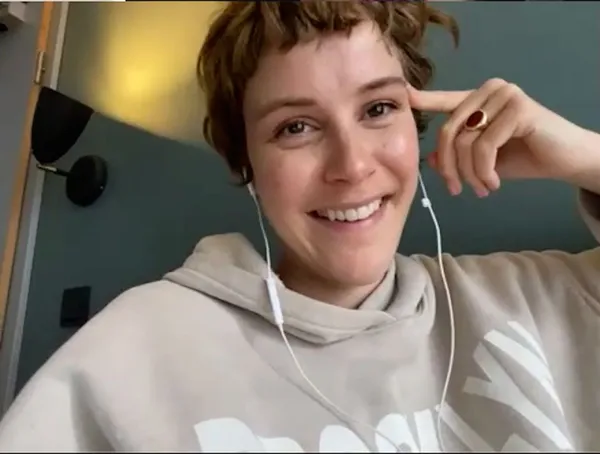 |
| When Hitler Stole Pink Rabbit star Carla Juri in her Brooklyn sweatshirt in Iceland, on her role: “I was wondering, they describe her as a bit more difficult. Ha, Ha! I like difficult!” |
Carla Juri has had a number of memorable performances since 2013, from David Wnendt’s adaptation of Charlotte Roche’s novel Wetlands to Frauke Finsterwalder’s Finsterworld, co-written with Christian Kracht, Denis Villeneuve’s Blade Runner 2049, and in 2021 Andy Goddard’s Six Minutes To Midnight and Caroline Link’s (Oscar winner for Nowhere In Africa, based on Stefanie Zweig’s novel) adaptation with Anna Brüggemann of Judith Kerr’s When Hitler Stole Pink Rabbit.
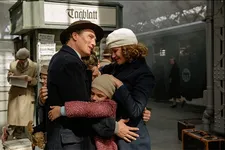 |
| The father Arthur Kemper (Oliver Masucci) reunited with his son Max (Marinus Hohmann), wife Dorothea (Carla Juri), and daughter Anna (Riva Krymalowski) |
Carla Juri, Riva Krymalowski, Oliver Masucci (a Joseph Beuys look-alike in Florian Henckel von Donnersmarck’s Never Look Away), and Marinus Hohmann star as the Kemper family, with a terrific ensemble cast, including Ursula Werner, Anne Bennent (Volker Schlöndorff’s Swann in Love and unforgettable in Hans W Geissendörfer’s The Wild Duck), and Justus von Dohnányi (Christian Petzold’s Transit). Housekeeper Heimpi (Werner) is the lost, doting presence children will remember all life long, the nosy concierge in Paris (Bennent) teaches them about the vileness of neighbourhood gossip, and uncle Julius (von Dohnányi) sends missives from their home country as it loses its soul.
Pink Rabbit is the story of a well-off Jewish family, the Kempers (Alfred Kerr’s actual family name was Kempner), living in Germany in 1933, the year the Nazis came to power. The father Arthur (Masucci), a famous theatre critic, modelled after the author’s father Alfred Kerr, is on Hitler’s hit list, and he and his wife Dorothea (Juri) and two children become refugees, first in Switzerland, then Paris, then London. The daughter Anna (Krymalowski), whose perspective is guiding us through the story, is a stand-in for Judith Kerr and how she experienced the numerous uprootings and what her parents did their best of disguising as an adventure.
The older brother Max (Hohmann), who calls his sister “little man” to her perpetual chagrin, plays along, together with Anna. It is as much about the parents comforting the children as it is about the kids signalling that they understand and are on board. Dorothea, once a celebrated pianist in Berlin, with her life turned upside down, is now mainly concerned with making sure that her children have enough to eat and a roof over their head.
 |
| Carla Juri on Anna (Riva Krymalowski) making a tough decision: “Pink Rabbit, was very much about protecting the children and not to make them feel the war.” |
The pink rabbit of the title is pivotal. Anyone who ever had a special bond with a stuffed animal will understand. It is a relationship that prepares you for future loves and the world ahead. How caring are you? How much can you be trusted taking care of someone else, even an inanimate object, let alone a pet? The vast discrepancy between the kind of guilt sparked by abandoning a toy, and the atrocities committed by the Nazis between 1933 and 1945, is what opens up, and where the genius lies in Judith Kerr’s book.
A perennial for introducing children to the Holocaust, the story works with the animistic worldview, the best of us never totally abandoned as adults. In Caroline Link’s film, we see Anna say goodbye to the rooms of the Grunewald villa she grew up in, the rocks and well of a small Swiss mountain village, and the Eiffel Tower. In 2021 it is a good reminder to treat the spaces around you with respect and to not take our beautiful world for granted.
From Iceland, Carla Juri joined me on Zoom for an in-depth conversation on When Hitler Stole Pink Rabbit.
Anne-Katrin Titze: Hi Carla, you’re wearing a Brooklyn sweatshirt! But you’re not in Brooklyn, are you?
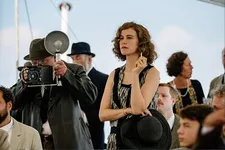 |
| Carla Juri on Dorothea: “So I thought, what happens to you if a war like that hits you in the middle of your life?” |
Carla Juri: No.
AKT: I’m in Brooklyn!
CJ: Oh really! Oh wow, how funny. Coincidence!
AKT: Where are you?
CJ: I’m in Iceland at the moment, finishing a film.
AKT: Can you tell me anything about it?
CJ: Yeah, we shot most of it in Japan and now we’re in Iceland for the last bit of it. It’s called Blood and it’s an American indie film. The director is Brad Gray, he’s done Interrupting Girl with Zoe Kazan [The Exploding Girl], I don’t remember. Anyway, I’m in quarantine for another four days.
AKT: Nothing like quarantine in Iceland! This is 2021 for sure.
CJ: I know!
AKT: In the US we could see you this year in two films; in both of them you play a German woman in the 1930s and they are really two ends of the spectrum. It’s like a dark mirror for the characters you play in When Hitler Stole Pink Rabbit and Six Minutes To Midnight.
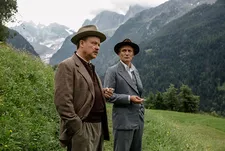 |
| Uncle Julius (Justus von Dohnányi) with Arthur (Oliver Masucci) |
CJ: True.
AKT: What’s the chronology of shooting? Which did you film first? Were they one after the other?
CJ: Yeah, they were, actually. I shot Six Minutes before, but the same year. Sometimes they lapped over. I had to fly to Berlin and go back to Wales to shoot. So they overlapped.
AKT: Wow!
CJ: I forgot about that!
AKT: In one, you are a Nazi, teaching girls in Wales, right before the war in the summer of 1939, and in the other one it is 1933 and you are fleeing Germany to Switzerland and then Paris with your Jewish family. What did this do to your relationship to history, this part of history?
CJ: To be honest, they were quite separate in my head. Because one, Pink Rabbit, was very much about protecting the children and not to make them feel the war. That we are scared and escape is an adventure. So that was the main focus. In the other one, the war and the drama of war was the main focus. So I had quite a separation there in a way.
AKT: And I remember seeing you in Finsterworld, where you have quite another adventure!
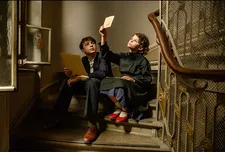 |
| Max (Marinus Hohmann) with Anna (Riva Krymalowski) in Paris |
CJ: Oh yeah! That’s Germany for you!
AKT: That’s Germany! I mean, totally! Being shoved into the oven by a classmate!
CJ: That was heavy.
AKT: Put those three together, if you want to show an alien to this planet what is Germany at that time, look at Carla Juri in these three films!
CJ: And I’m not even German.
AKT: Did you know the book When Hitler Stole Pink Rabbit before?
CJ: I didn’t, actually. I know that in Germany it’s a mandatory book for children to understand what happened. Before the age of ten it’s really hard to explain what happened. So it’s the first approach for them to understand without shocking them, but to have a more age-appropriate storytelling. So in Germany it’s very famous because it really has to do with their history. Where I grew up [in Switzerland] it’s not at all, because we have different history. The writer of the book - what is her first name again?
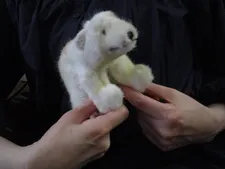 |
| Anne-Katrin Titze's Steiff Eisbär, a stand-in for Carla Juri’s special toy: “I still have one. One is an Eisbär, so he’s still around.” Photo: Ed Bahlman |
AKT: Judith.
CJ: Judith, exactly, Judith Kerr, she was really famous in England, but not for that book, but for the other one, The Tiger Comes for Tea. So the English people, funny enough, know Judith Kerr very well, but for another reason, another book. And I think some also responded to When Hitler Stole Pink Rabbit in England, but not as much. So I learned all that later, not when I was a kid, no.
AKT: The book has a wonderful way into children’s minds, through that toy. The film captures that very well. You as the mother [Dorothea] have a strong scene saying “Two books, one toy, don’t get sick.” It connects to a child’s sense of responsibility, even guilt, in relation to our toys. It also works for adults. Mr Rogers made that point. I don’t know if you’ve seen [Morgan Neville’s Won't You Be My Neighbor?] documentary on Mr Rogers’ Neighborhood or the feature [A Beautiful Day In The Neighborhood] with Tom Hanks?
CJ: Yes, yes I have.
AKT: The idea is that you get to people, even as adults, by asking “Did you have a special friend? Was there one particular toy?” That’s the way in. Did you have a special toy, apropos?
CJ: I’m sure I did. I’m thinking, I don’t know why I go straight to animals. I still have one. One is an Eisbär [polar bear], so he’s still around.
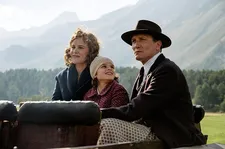 |
| Dorothea (Carla Juri) on the road with Anna (Riva Krymalowski) and Arthur (Oliver Masucci) |
AKT: It’s so funny how many people have a bond like that. I talked to Whit Stillman, and in Metropolitan he had an important scene with a toy owl. I had the same Steiff owl, probably your Eisbär is Steiff too, and I brought it to the interview. A man in his sixties, I guess, immediately reacted to the toy and grabbed it. That is part of the emotional power of Kerr’s book and the movie and what it talks about.
CJ: Oh, yes.
AKT: A scene I particularly liked takes place in Paris, when you, Dorothea, look into the shop window with your husband. You say “I look terrible,” and then he gets you a cake.
CJ: Yeah, what struck me of the character is that she’s a different age than her husband when the war hits, and they’re a completely different age than their children. She’s thirty, the husband was a lot older, he was maybe double, sixty years old. And the children, of course, are eight and ten, or around that. So I thought, what happens to you if a war like that hits you in the middle of your life? Not at the end or at the beginning? The sacrifices, the different kind of sacrifices. That scene for me was that. Her in particular, what she misses. She’s lost also in that particular phase in her life.
AKT: She is based on the author’s mother, in part.
 |
| Whit Stillman with Anne-Katrin Titze's Steiff owl Photo: Anne-Katrin Titze |
CJ: Yes.
AKT: Julia Weismann [second wife of culture critic Alfred Kerr] had a fascinating biography herself. She was a composer, she later worked as a secretary and translator at the Nuremberg Trials. And she wrote an opera about time travel! There’s a little Blade Runner link. Did you do research on her?
CJ: I did. Because it felt like the daughter, Judith Kerr, had a bit of ambiguity. She loved her father, which is very clear, but with the mother there were some kind of difficulties with the relationship, I felt. This is what I’ve read, that the mother was a little bit more troubled. That left a bit of an ambiguous relationship for the kid towards the mother. She’s maybe a little bit less positive than the father. That kind of interested me. I was wondering, they describe her as a bit more difficult. Ha, Ha! I like difficult!
AKT: You sure do!
CJ: That’s why I was like, yeah, great. I was curious about that. And curious also about the transition, because before, as you said, a composer, and then at the end when they landed in London she had to start from nothing again, cleaning toilets. So that in the middle of your life, as we were saying, just complete switch for her of reality, that must have been just an out-of-body experience, I guess.
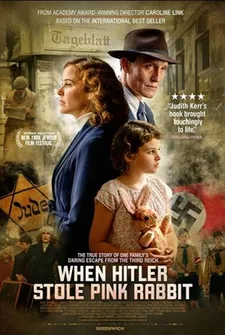 |
| When Hitler Stole Pink Rabbit opens in New York and Los Angeles on May 21 |
AKT: You see the underlying frustration she experiences in the apartment in Paris. I liked the way you were knitting, signalling: I am a pianist, I am a composer, now I sit in this dump, knitting. But I do it for my children. It’s really nice how you capture both. Apropos, when you did Blade Runner 2049, did you ever talk to Hampton Fancher, the screenwriter?
CJ: No, I didn’t. I read the book.
AKT: Thank you so much for taking the time from quarantine in Iceland!
CJ: Thank you, Anne-Katrin!
AKT: Have fun in Iceland!
CJ: You too, have a good afternoon!
Coming up - Carla Juri on walking into the apartment of your character, working with children, the presence of Anne Bennent in When Hitler Stole Pink Rabbit, Peter Greenaway’s Walking to Paris with Constantin Brancusi, tapping into the past, and playing the piano.
When Hitler Stole Pink Rabbit opens on Friday, May 21 at the Quad Cinema & Cinema 123 by Angelika in New York and in Los Angeles at the Laemmle Royal.





















